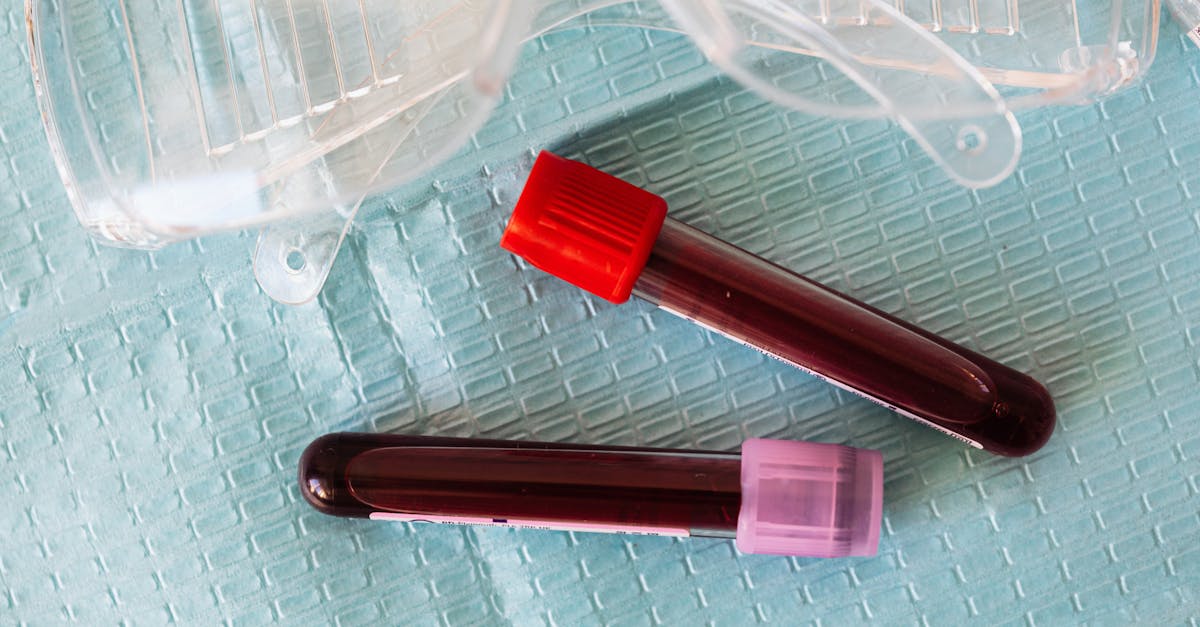Introduction
Blood tests for marriage were once a requirement for couples planning to tie the knot. These tests were designed to detect certain diseases that could be passed on to offspring. However, over time, the practice of requiring blood tests for marriage has been abolished in many countries. This has left many people wondering when and why this change occurred.
The keyword for this blog post is "When Did They Stop Doing Blood Tests for Marriage?" It's a question that many people have, especially those who are planning to get married or are simply curious about the history of marriage laws.
In this blog post, we will explore the history of blood tests for marriage, the controversy surrounding them, and the alternatives that have been introduced since their abolishment. We will also discuss the impact of this change on public health.
Blood tests for marriage were first introduced in the early 1900s as a way to detect syphilis, a sexually transmitted disease that can cause serious health problems if left untreated. Over time, other diseases such as rubella and hepatitis were added to the list of tests required for marriage.
The prevalence of blood tests for marriage varied from country to country. In the United States, for example, blood tests were required in most states until the 1980s. In other countries, such as France and Germany, blood tests for marriage were never required.
In recent years, blood tests for marriage have become controversial. Some argue that they are an invasion of privacy and that they perpetuate the stigma surrounding certain diseases. Others argue that they are necessary to protect public health.
Despite the controversy, blood tests for marriage have been abolished in many countries. In the United States, for example, all states have abolished the requirement for blood tests for marriage. Instead, couples are encouraged to get tested for sexually transmitted diseases and other health issues before getting married.
In conclusion, the practice of requiring blood tests for marriage has a long and complex history. While they were once seen as necessary to protect public health, they have since been abolished in many countries. Today, couples are encouraged to take responsibility for their own health and get tested before getting married.
Table of Content
- History of Blood Tests for Marriage
- Controversy Surrounding Blood Tests for Marriage
- Abolishment of Blood Tests for Marriage
- Alternatives to Blood Tests for Marriage
- Conclusion
History of Blood Tests for Marriage
Blood tests for marriage were once a common requirement for couples who wanted to tie the knot. The tests were introduced in the early 20th century as a way to prevent the spread of sexually transmitted diseases (STDs) such as syphilis and gonorrhea. The tests were designed to detect the presence of these diseases in the blood of the individuals getting married.
The first blood test for marriage was introduced in 1907 in the United States. The test was called the Wassermann test and it was used to detect syphilis. Over time, other tests were introduced to detect other STDs such as gonorrhea and HIV.
Different countries had different requirements for blood tests for marriage. In some countries, only one partner was required to take the test, while in others, both partners were required to take the test. Some countries required additional tests such as a chest X-ray to detect tuberculosis.
Despite the initial success of blood tests for marriage in preventing the spread of STDs, they soon became controversial. Critics argued that the tests were an invasion of privacy and that they stigmatized individuals with STDs. Others argued that the tests were ineffective in preventing the spread of STDs and that they gave a false sense of security to couples who tested negative.
As a result of these criticisms, blood tests for marriage were gradually abolished in many countries. The United States was one of the last countries to abolish blood tests for marriage, with the last state (Mississippi) abolishing the requirement in 1980.
Today, there are no longer any requirements for blood tests for marriage in most countries. Instead, couples are encouraged to get tested for STDs before getting married and to practice safe sex to prevent the spread of STDs. While blood tests for marriage may have been an effective tool in the past, they are no longer considered necessary or effective in preventing the spread of STDs.

Controversy Surrounding Blood Tests for Marriage
Blood tests for marriage were once a requirement in many countries. However, as time passed, these tests became controversial due to various reasons. One of the main arguments against blood tests for marriage was that they violated an individual's privacy. Many people felt that it was unfair to require them to undergo medical tests just to get married.
Another argument against blood tests for marriage was that they were not effective in preventing the spread of diseases. Some people argued that the tests only detected a limited number of diseases and that they were not comprehensive enough to be effective. Additionally, some people felt that the tests were discriminatory, as they targeted certain groups of people, such as immigrants.
The legal and ethical issues associated with blood tests for marriage were also a cause for concern. Some people felt that requiring blood tests for marriage violated an individual's right to marry. Others argued that the tests were a form of discrimination, as they targeted certain groups of people.
Despite the controversy surrounding blood tests for marriage, they remained a requirement in many countries for several decades. However, as medical technology advanced and more effective methods of disease prevention were introduced, blood tests for marriage were gradually abolished.
Today, there are several alternatives to blood tests for marriage, such as premarital counseling and education. These alternatives focus on educating couples about the importance of safe sex practices and disease prevention. While blood tests for marriage may have been controversial in the past, they have paved the way for more effective methods of disease prevention and education.

Abolishment of Blood Tests for Marriage
Blood tests for marriage were once a requirement in many countries around the world. However, as time passed, the practice became increasingly controversial. In response to the growing concerns, many countries began to abolish the requirement for blood tests for marriage.
The United States was one of the first countries to abolish blood tests for marriage. In 1980, the state of New York became the last state to repeal the requirement for blood tests for marriage. The decision was made after it was determined that the tests were not effective in preventing the spread of sexually transmitted diseases.
Other countries followed suit, with many European countries abolishing the requirement for blood tests for marriage in the 1990s. Today, blood tests for marriage are no longer required in most countries around the world.
The abolishment of blood tests for marriage has had a significant impact on public health. While the tests were originally intended to prevent the spread of sexually transmitted diseases, they were not very effective in doing so. Instead, they often led to discrimination against individuals with certain medical conditions.
Today, there are alternative methods for preventing the spread of sexually transmitted diseases. These include education, testing, and treatment. While blood tests for marriage may have once been seen as a necessary precaution, they are no longer considered an effective way to prevent the spread of sexually transmitted diseases.

Alternatives to Blood Tests for Marriage
After the abolishment of blood tests for marriage, several alternatives were introduced to ensure that couples were aware of any potential health risks before getting married. One of the most common alternatives is premarital counseling, which involves meeting with a counselor or healthcare provider to discuss any potential health issues and how to manage them. This can include discussing family medical history, lifestyle habits, and genetic testing.
Another alternative is self-disclosure, where couples are encouraged to openly discuss any health issues they may have with each other before getting married. This can help to build trust and ensure that both partners are aware of any potential risks.
Genetic testing is also becoming more popular as an alternative to blood tests for marriage. This involves testing for genetic mutations that can increase the risk of certain diseases or conditions. If a couple is found to be at risk, they can then make informed decisions about their future together.
However, these alternatives are not without their drawbacks. Premarital counseling and self-disclosure rely heavily on the honesty and openness of both partners, which may not always be the case. Genetic testing can also be expensive and may not be covered by insurance.
Overall, while blood tests for marriage may no longer be required, it is still important for couples to be aware of any potential health risks before getting married. By exploring the different alternatives available, couples can make informed decisions about their future together and ensure that they are taking the necessary steps to protect their health and well-being.

Frequently Asked Questions
When did US stop requiring blood test for marriage?
The US stopped requiring blood tests for marriage in the early 2000s. The last state to require blood tests for marriage was Mississippi, which ended the requirement in 2012.
Do you still need a blood test to get married in America?
No, you do not need a blood test to get married in America anymore. Blood tests for marriage were once required to check for sexually transmitted diseases, but they were phased out in the 1980s and 1990s.
Why did they check blood types before marriage?
Blood tests were conducted before marriage to check for blood type compatibility and the risk of genetic disorders in offspring. This was especially important for Rh factor incompatibility, which can cause serious health problems for the baby.
Why did you need a blood test to get married in the USA?
In the past, blood tests were required for couples to get married in the USA to check for certain diseases, such as syphilis and rubella, which could be passed on to offspring. This was done to prevent the spread of these diseases and protect public health.
Conclusion
In conclusion, blood tests for marriage were once a common requirement for couples seeking to get married. However, due to controversy surrounding the tests and advancements in medical technology, they have been abolished in many countries. While blood tests for marriage were initially introduced to prevent the spread of certain diseases, they were eventually deemed unnecessary and invasive.
Today, couples have access to a variety of alternatives, such as genetic counseling and testing, to ensure that they are aware of any potential health risks before getting married. These alternatives are less invasive and more effective in preventing the spread of diseases.
It is important to note that while blood tests for marriage may no longer be required, it is still important for couples to take responsibility for their own health and the health of their partners. This includes getting regular check-ups and discussing any potential health concerns with their healthcare provider.
In conclusion, the abolishment of blood tests for marriage has had a positive impact on public health and has allowed couples to make informed decisions about their health and future together.




